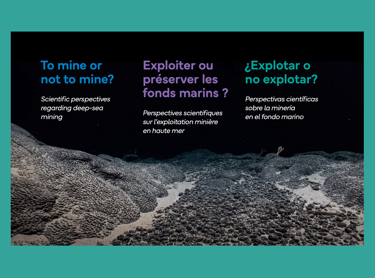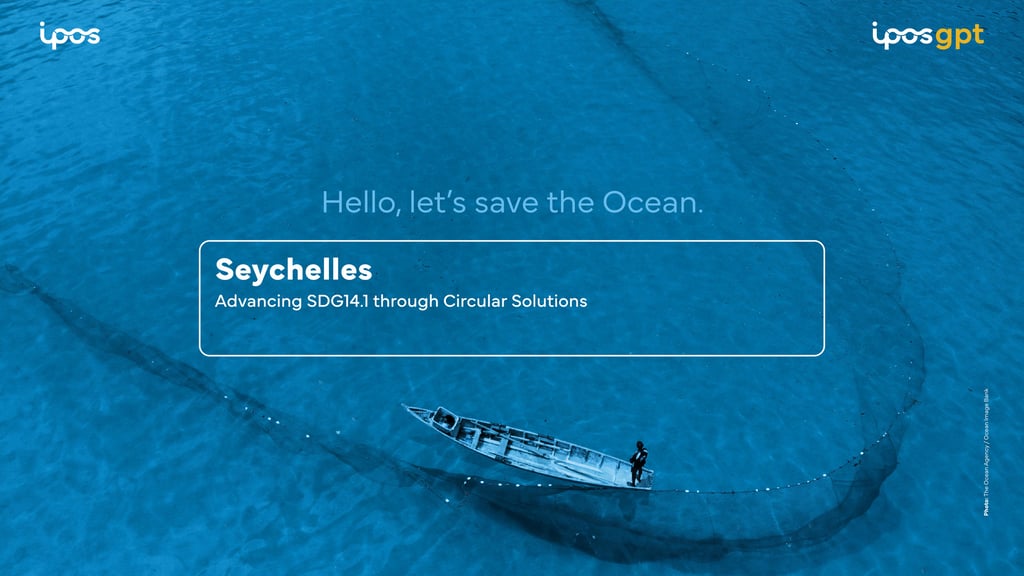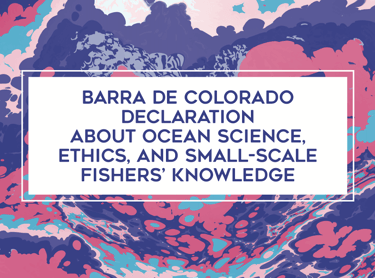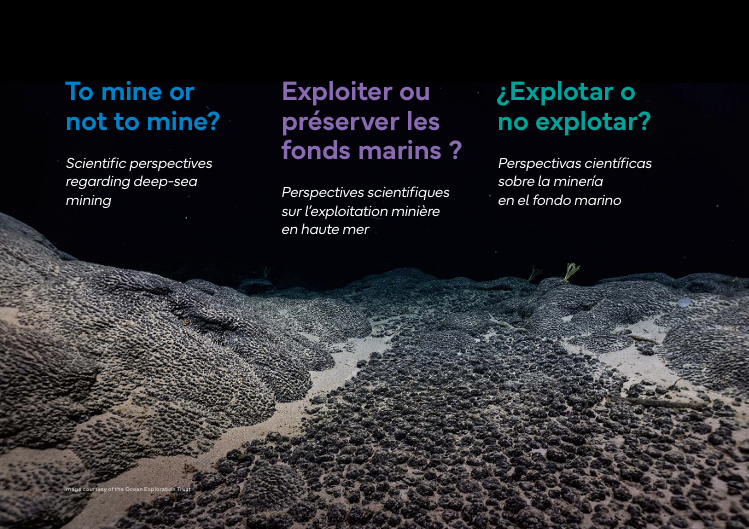Pilot Projects
The IPOS has already started working to accompany States in their achievement of the international targets they are committed to. The Pilot Projects demonstrate the capacity of the IPOS to coordinate highly qualitative research, gathering policy-makers, scientists and representants of the civil society.
The Global Deep Sea Consultation's results were published on March 31st, 2025.
The Seychelles Rapid Response early results were shared at Our Ocean conference in April and final results published in September 2025.
The Small-Scale Fisheries in Costa Rica Project was completed during the UNOC-3 in June 2025.
The Global Deep Sea Consultation
In October 2023, French President Emmanuel Macron requested an international scientific consultation to synthesize the "scientific evidence concerning the serious risks that the international community would take by allowing the exploitation of the deep sea."
In response, Bruno David, President of the Muséum national d'histoire naturelle from 2015 to 2023, together with Towards IPOS created an international scientific committee to compile expert advice and recommendations from deep-sea scientists and a large range of knowledge holders from around the globe.
Our committee is co-chaired by Elva Escobar-Briones (Mexico) & Ricardo Serrão Santos (Portugal) and coordinated by Kelsey Archer Barnhill (United States).
Our scientific committee members were selected to represent diverse genders and geographical backgrounds, providing expertise in both natural and social sciences within the fields of deep-sea research, ocean governance, mineral resources, environmental economics, ecosystem management, and oceanography.
Our international and transdisciplinary approach aims to deliver inclusive and comprehensive insights to bridge the science-policy interface within the deep-sea mining debate.
This consultation worked on two main outputs: a brief position statement backed with signatures, and an expert question and answer booklet.
Through compiling expert advice, insight, and recommendations from experts across disciplines and geographies, this Towards IPOS pilot project produces scientifically credible, contextually relevant, and globally resonant recommendations.
These outputs were launched on the 31st of March 2025 at the SOS Ocean event in Paris, France and will be featured at the One Ocean Science Congress (3-6 June 2025) and UN Ocean Conference (28 May - 13 June 2025).
You can find the two outputs and more on this project here:
The IPOS OceanGPT
IPOS partnered with Vital Ocean and RediMinds to build an Aritificial Intelligence-powered large language model (LLM) that served as a co-pilot for the IPOS team. This tool enhances IPOS’s ability to digest large volumes of global knowledge to develop high-level information briefs and custom policy action option portfolios, considering each country’s unique policy and regulatory processes to meet its sustainability commitments.
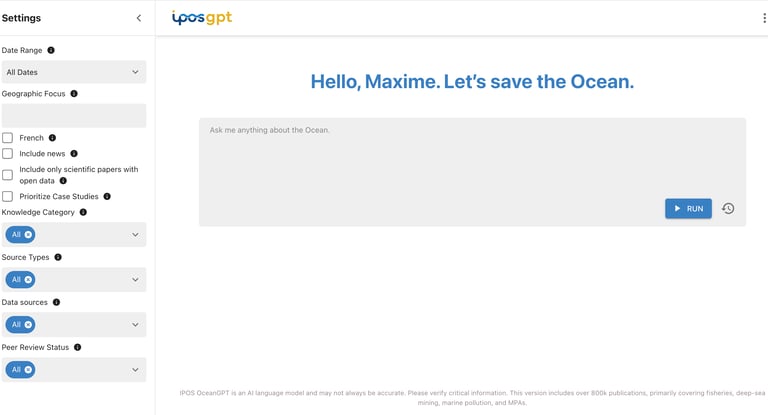

The LLM utilizes a user-friendly interface with tools tailored to different policymaking needs, prompt engineering to augment user input, and Retrieval Augmented Generation (RAG) to fetch and rank data from pre-determined sources.
The development process starts with the User Input Module capturing and directing user questions. The Keyword Extraction Module identifies key phrases, and the Source Selection Module matches them with relevant data sources. The Fact-checking and Relevance Module verifies data accuracy and relevance. The Prompt Tuning Module refines user intent for enhanced response quality.
The Foundation LLM, incorporating models like ChatGPT, Claude 3.5, and Gemini, generates detailed responses. The Response Synthesis Module ensures coherence, and the User Response Delivery Module provides the final answer with source attributions.
The key differentiators of the tools are:
Scientific Integrity: Built on a foundation of high-quality scientific data, the LLM will accurately source-track information from credible reports and journals.
Comprehensive Knowledge Synthesis: The model will convert complex, technical information into concise, non-expert-friendly recommendations tailored for policy use.
Diverse Perspectives: Incorporates a broad range of knowledge, including Indigenous and local community insights, global case studies, NGO and private sector.
Local Policy Customization: Includes local policy knowledge to generate customized policy pathways, ensuring that recommendations are relevant and actionable within national contexts.
Ethical and Transparent: Designed in alignment with UN standards for data handling and AI ethics
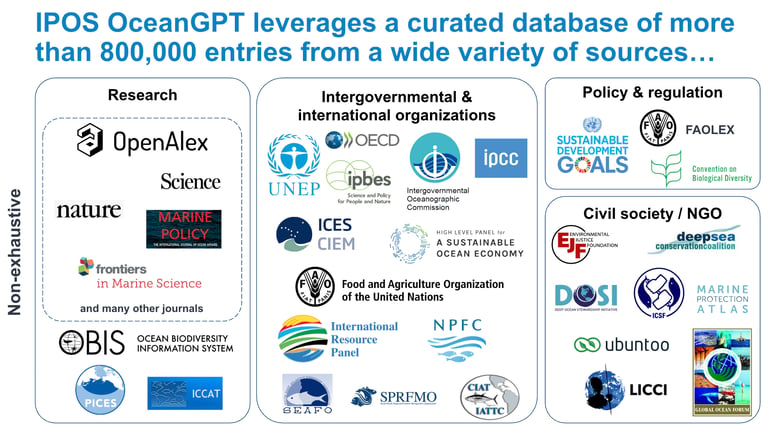

The LLM was discussed during the Our Ocean Conference in Busan (South Korea) in April 2025, and showcased at the UN Ocean Conference in June 2025.
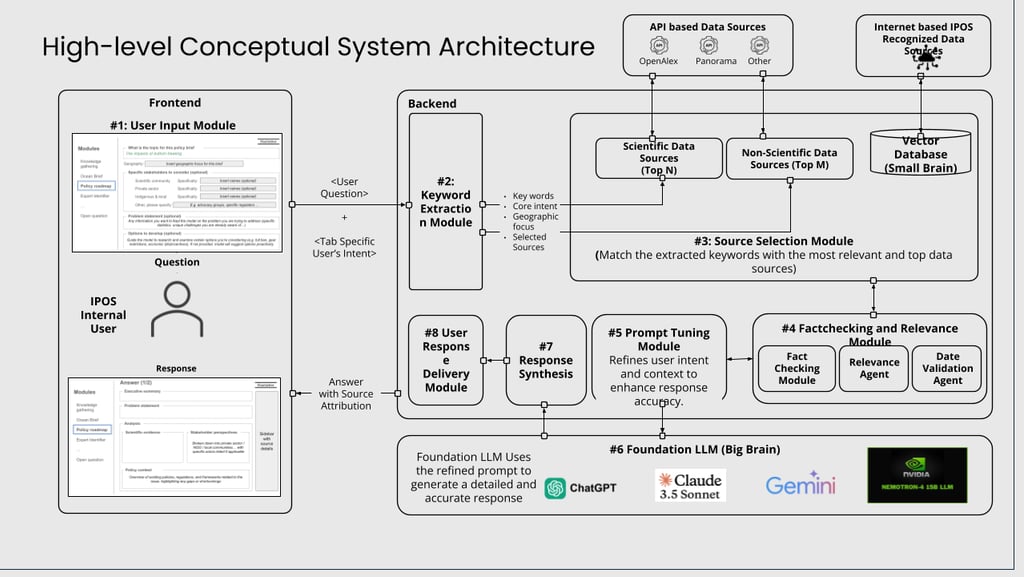

The project notably focused on three key areas:
LLM Development: Collecting and normalizing ocean data, prioritizing sources, and building and testing the LLM to ensure accuracy and reliability.
Real-World Application with the Seychelles: Collaborating with the Seychelles to apply the LLM in real-world scenarios, supporting their journey toward achieving global ocean sustainability targets. This use case will directly inform the tool’s development.
Scientific Oversight: Assembling a scientific committee to guide the LLM's development and ensure its outputs are scientifically rigorous and actionable.

Small Scale Fisheries in Costa Rica
IPOS aims to be inclusive, holistic, action-oriented and demand-driven, in order to accelerate the achievement of international ocean sustainability targets and frameworks. This requires the inclusion of Indigenous and Local Knowledge (ILK) alongside environmental sustainability and social equity. Despite the fundamental inputs that it provides to ocean conservation and sustainable use, local, contextual knowledge from Indigenous People and Local Communities (IPLC), is insufficiently recognized in ocean science and policy.
For several years, especially since the UNOC 2017, IPLC small scale fishers (SSF) have been increasingly organized to have their priorities represented and reported. For instance, the Call for Action from SSF launched in UNOC 2022 (Lisbon), set five key priorities in the context of the implementation of the SSF Voluntary Guidelines by nation states.
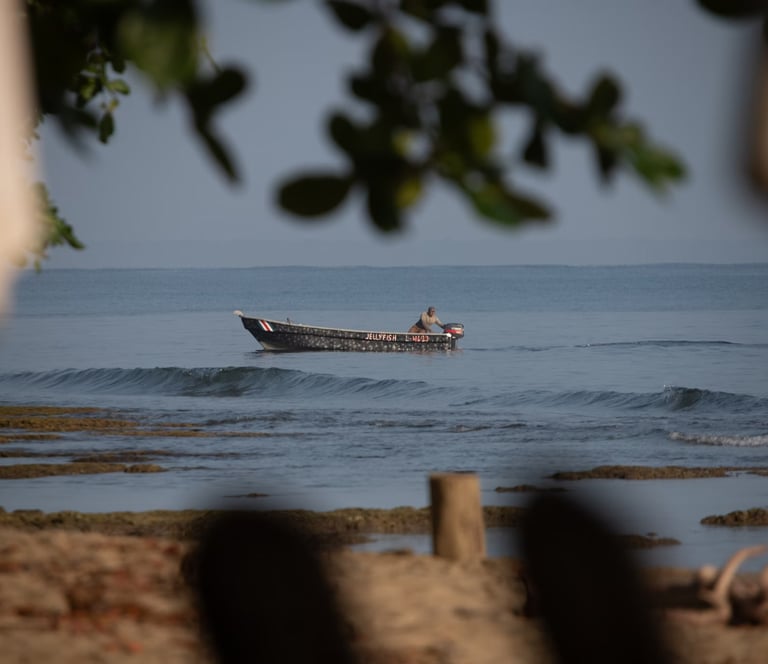

The objective of this project was to experiment with and identify opportunities, challenges, and best practices for the inclusive and equitable engagement of IPLC knowledge and experience, particularly from small-scale fisherfolks, in key on-going ocean decision-making processes.
To do so, this project focused on:
Testing engagement strategies for generating an inclusive knowledge evidence base for transformative ocean governance which will contribute to the UNESCO objectives to include IPLC in Ocean Science and Policy.
Making a valuable contribution towards achieving priority targets of the GBF related to ocean conservation and IPLC small scale fishers through a case study in Costa-Rica.
The first results of this project were presented at the UN Ocean Conference in June 2025 in collaboration with our Costa Rican partners.
IPOS aims to be inclusive, holistic, action-oriented and demand-driven, in order to accelerate the achievement of international ocean sustainability targets and frameworks. This requires the inclusion of Indigenous and Local Knowledge (ILK) alongside environmental sustainability and social equity. Despite the fundamental inputs that it provides to ocean conservation and sustainable use, local, contextual knowledge from Indigenous People and Local Communities (IPLC), is insufficiently recognized in ocean science and policy.
For several years, especially since the UNOC 2017, IPLC small scale fishers (SSF) have been increasingly organized to have their priorities represented and reported. For instance, the Call for Action from SSF launched in UNOC 2022 (Lisbon), set five key priorities in the context of the implementation of the SSF Voluntary Guidelines by nation states.


The Objective of this project is to experiment with and identify opportunities, challenges, and best practices for the inclusive and equitable engagement of IPLC knowledge and experience, particularly from small-scale fisherfolks, in key on-going ocean decision-making processes.
To do so, this project intends to:
Test engagement strategies for generating an inclusive knowledge evidence base for transformative ocean governance which will contribute to the UNESCO objectives to include IPLC in Ocean Science and Policy.
Make a valuable contribution towards achieving priority targets of the GBF related to ocean conservation and IPLC small scale fishers through a case study in Costa-Rica.
The first results of this project are expected to be presented at the UN Ocean Conference in June 2025 in collaboration with our Costa Rican partners.

